1 Forecasting king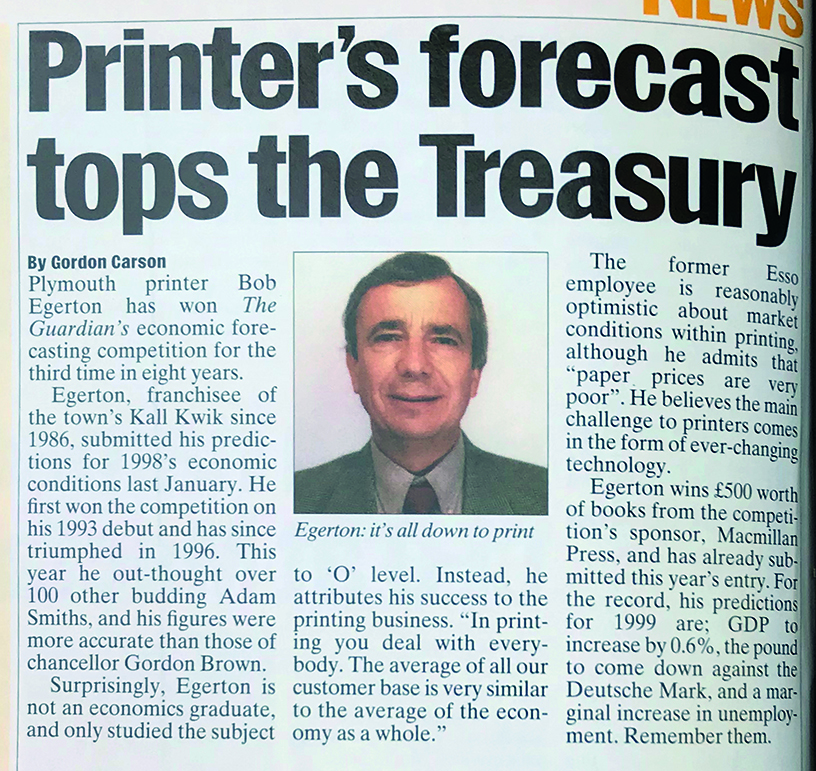 You don’t need From the Archive to tell you that printers are a bright bunch, especially when it comes to business. However, Bob Egerton, a Kall Kwik franchisee in Plymouth, is one smart cookie. In 1999, he won The Guardian’s economic forecast competition for the third time in eight years without any qualification in economics. According to the report, the figures he submitted to the competition, sponsored by Macmillan Press, were more accurate than chancellor Gordon Brown’s. He puts his success down to the scope of the printing.
You don’t need From the Archive to tell you that printers are a bright bunch, especially when it comes to business. However, Bob Egerton, a Kall Kwik franchisee in Plymouth, is one smart cookie. In 1999, he won The Guardian’s economic forecast competition for the third time in eight years without any qualification in economics. According to the report, the figures he submitted to the competition, sponsored by Macmillan Press, were more accurate than chancellor Gordon Brown’s. He puts his success down to the scope of the printing.
2 Cracking ad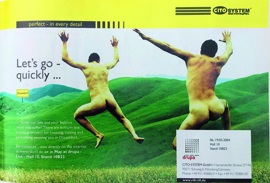 From the Archive isn’t quite sure what sort of message this ad wants to communicate. Rolling green hills, two naked chaps leaping about with gay abandon and, in the distance, a small yellow sign saying “Düsseldorf”. “Perfect – in every way”, reads the strapline at the top. Well, okay, if that’s your idea of perfection. “Let’s go – quickly” is probably good advice if you’re discovered in flagrante, but Düsseldorf seems an odd choice of safe haven if you’re starkers, particularly when Drupa is on.
From the Archive isn’t quite sure what sort of message this ad wants to communicate. Rolling green hills, two naked chaps leaping about with gay abandon and, in the distance, a small yellow sign saying “Düsseldorf”. “Perfect – in every way”, reads the strapline at the top. Well, okay, if that’s your idea of perfection. “Let’s go – quickly” is probably good advice if you’re discovered in flagrante, but Düsseldorf seems an odd choice of safe haven if you’re starkers, particularly when Drupa is on.
3 Card sharps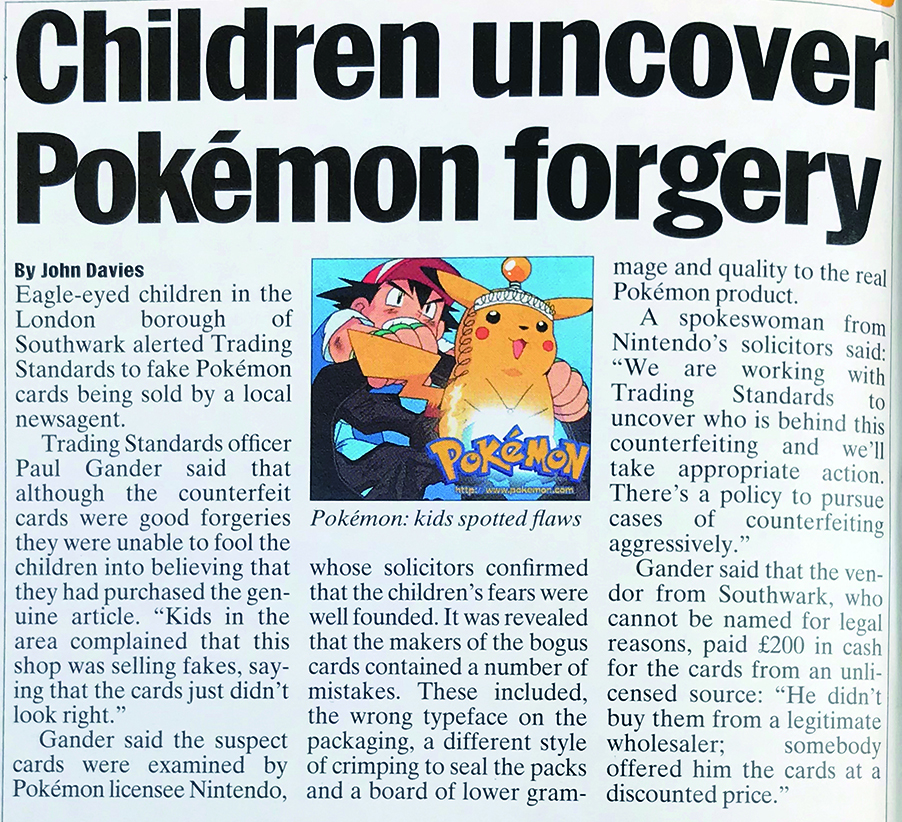 Even as a child, From the Archive could never see the point in trading or collecting cards, but plenty of kids did and obsessed about completing sets of… I don’t know what. Football players? He-Men? Transformers? Which brings us to Pokémon, the Japanese trading card phenomenon that took the West by storm. These cards became so valuable that it was very profitable for forgers to knock out faked versions, provided the copies were good enough to be sold. But never underestimate the natural suspicion and cynicism of children, nor their unerring ability to spot when they are being cheated by grown-ups. A London newsagent was investigated after local kids alerted police to faked cards sold in the shop. Apparently, the youngsters picked up on different crimping styles on the packs and lower-grammage board used for the cards.
Even as a child, From the Archive could never see the point in trading or collecting cards, but plenty of kids did and obsessed about completing sets of… I don’t know what. Football players? He-Men? Transformers? Which brings us to Pokémon, the Japanese trading card phenomenon that took the West by storm. These cards became so valuable that it was very profitable for forgers to knock out faked versions, provided the copies were good enough to be sold. But never underestimate the natural suspicion and cynicism of children, nor their unerring ability to spot when they are being cheated by grown-ups. A London newsagent was investigated after local kids alerted police to faked cards sold in the shop. Apparently, the youngsters picked up on different crimping styles on the packs and lower-grammage board used for the cards.
4 Stinkin’ badges!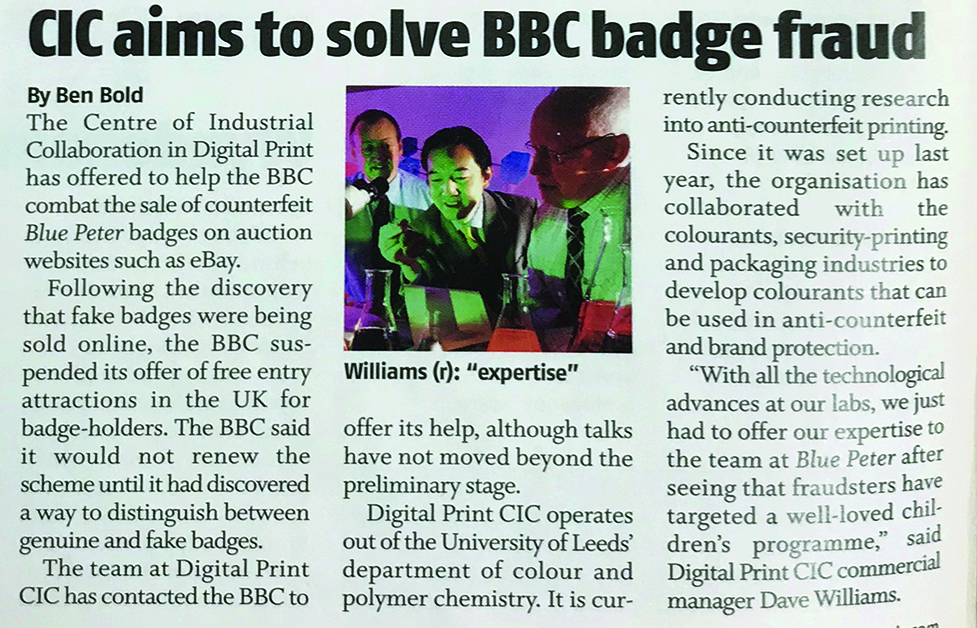 For From the Archive, and many others of its generation, the Blue Peter Badge was perhaps childhood’s most coveted object, so imagine our horror at the idea that some unprincipled scoundrel was flogging hooky ones! Print technology was recruited into the team tackling this heinous villainy, with the Centre of Industrial Collaboration in Digital Print volunteering its expertise in colourants and security printing to help the BBC identify the fakers.
For From the Archive, and many others of its generation, the Blue Peter Badge was perhaps childhood’s most coveted object, so imagine our horror at the idea that some unprincipled scoundrel was flogging hooky ones! Print technology was recruited into the team tackling this heinous villainy, with the Centre of Industrial Collaboration in Digital Print volunteering its expertise in colourants and security printing to help the BBC identify the fakers.
5 What’s in a name?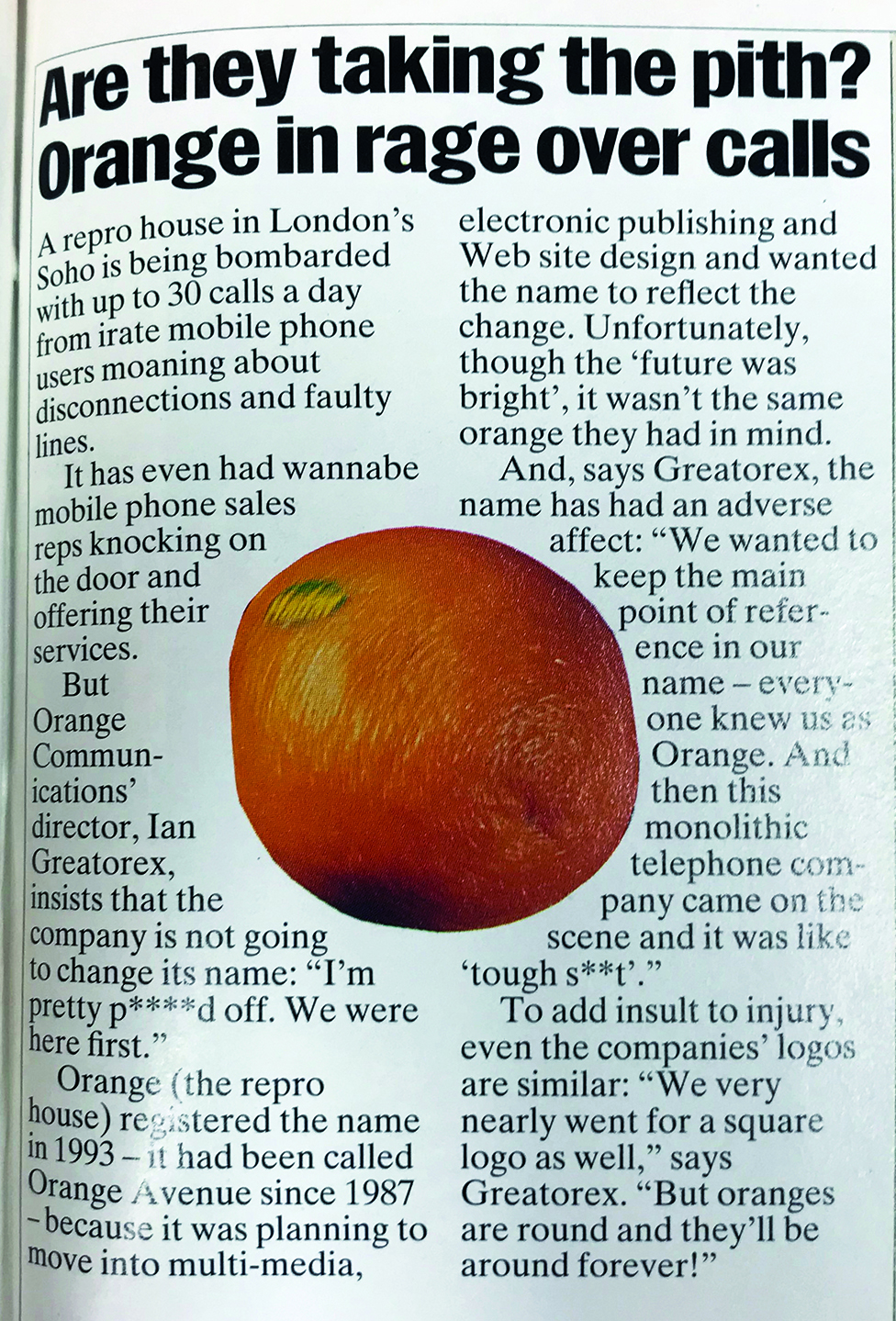 Repro house Orange Communications registered its name in 1993 at roughly the same time as a certain mobile phone network – something that Joe Public is much more likely to associate with “communications” – set up shop in the UK. As a result, the repro firm found itself fielding endless phone calls from disgruntled Orange customers “moaning about disconnections and faulty lines”. Director Ian Greatorex said: “I’m pretty p****d off.” (From the Archive is going to go out on a limb and suggest he said he was ‘pissed off’.) “We were here first… Everyone knew us as Orange and then this monolithic telephone company came on the scene and it was like ‘tough s**t’.” (FTA: “shit”, reckon). Sadly, the future was dim for Orange Communications; it didn’t last long enough to see its mobile network adversary merge with T-Mobile to form EE and enable it to reclaim its nominal birth right – it was liquidated in 2004.
Repro house Orange Communications registered its name in 1993 at roughly the same time as a certain mobile phone network – something that Joe Public is much more likely to associate with “communications” – set up shop in the UK. As a result, the repro firm found itself fielding endless phone calls from disgruntled Orange customers “moaning about disconnections and faulty lines”. Director Ian Greatorex said: “I’m pretty p****d off.” (From the Archive is going to go out on a limb and suggest he said he was ‘pissed off’.) “We were here first… Everyone knew us as Orange and then this monolithic telephone company came on the scene and it was like ‘tough s**t’.” (FTA: “shit”, reckon). Sadly, the future was dim for Orange Communications; it didn’t last long enough to see its mobile network adversary merge with T-Mobile to form EE and enable it to reclaim its nominal birth right – it was liquidated in 2004.
6 Paper up in the air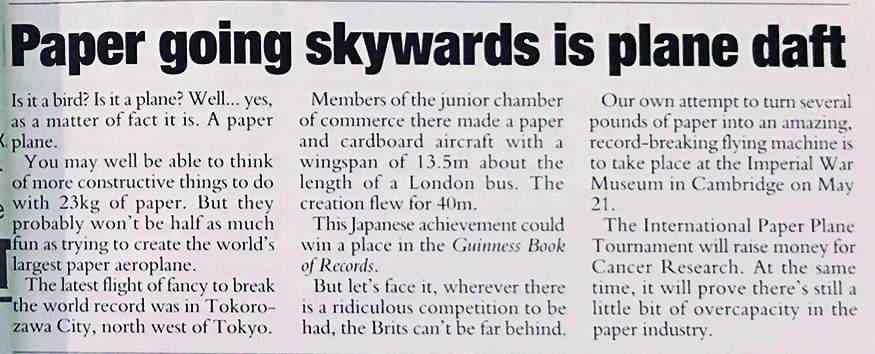 From the Archive wonders how “junior” a team from the junior chamber of commerce in Tokorozawa City, north west of Tokyo, were when they conceived a plan to launch a 13.5m, 23kg paper plane into the air as part of a plan to secure a spot in the Guinness Book of Records. That said, the plane’s 40m flight must have been an impressive sight.
From the Archive wonders how “junior” a team from the junior chamber of commerce in Tokorozawa City, north west of Tokyo, were when they conceived a plan to launch a 13.5m, 23kg paper plane into the air as part of a plan to secure a spot in the Guinness Book of Records. That said, the plane’s 40m flight must have been an impressive sight.
7 Much wow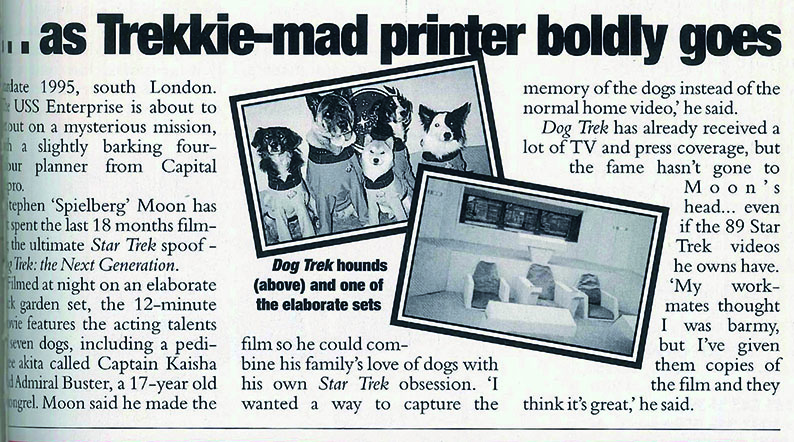 Stephen “Spielberg” Moon was the focus of this news item following completion of his own 12-minute contribution to the Star Trek cannon, a project that had taken him 18 months to film on a hand-built set in his back garden. Sadly, a trawl through YouTube has failed to locate Dog Trek: The Next Generation, but it apparently starred a pedigree akita as Captain Kaisha and Admiral Buster, a 17-year-old mongrel alongside the rest of the seven-strong canine cast. “My workmates thought I was barmy, but I’ve given them copies of the film and they think it’s great,” said Moon. Sure they do, Stephen, sure they do.
Stephen “Spielberg” Moon was the focus of this news item following completion of his own 12-minute contribution to the Star Trek cannon, a project that had taken him 18 months to film on a hand-built set in his back garden. Sadly, a trawl through YouTube has failed to locate Dog Trek: The Next Generation, but it apparently starred a pedigree akita as Captain Kaisha and Admiral Buster, a 17-year-old mongrel alongside the rest of the seven-strong canine cast. “My workmates thought I was barmy, but I’ve given them copies of the film and they think it’s great,” said Moon. Sure they do, Stephen, sure they do.
8 All change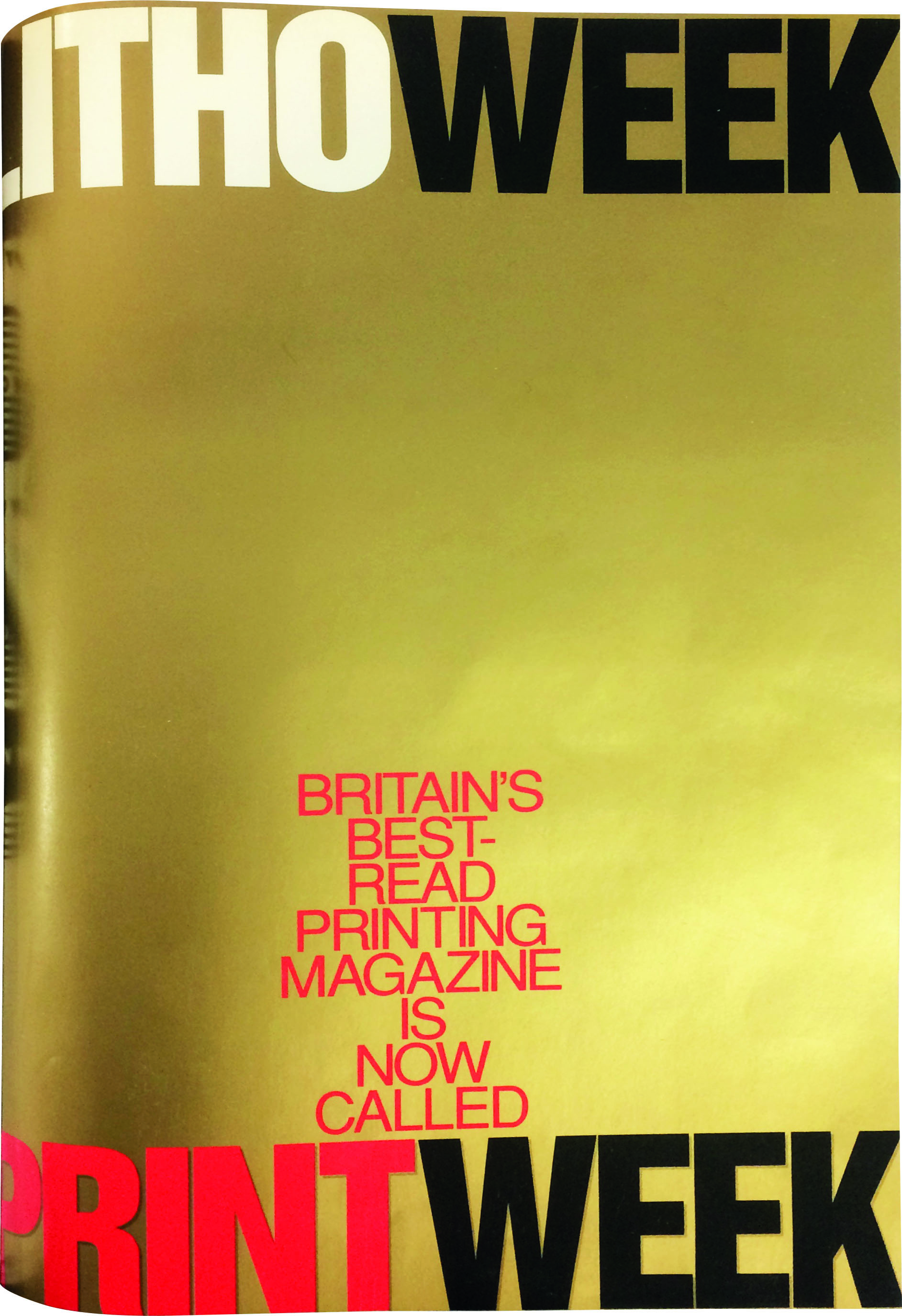 Back in this year, a remarkable transformation was taking place. At the end of April, “Britain’s best-read printing magazine” LithoWeek had retreated into a chrysalis to emerge a week later as the glorious butterfly we know today as Printweek – although it eschewed gossamer wings in favour of metallic gold cover wrap. The mag was now on all-gloss stock and printed four-colour throughout (well, nearly). “More of everything” was the message, but the real story was the acceptance that litho was only part of an industry that was progressing technologically in leaps and bounds. The move was a recognition that the print “village” was expanding and its community more diverse. Well said, but what was the year?
Back in this year, a remarkable transformation was taking place. At the end of April, “Britain’s best-read printing magazine” LithoWeek had retreated into a chrysalis to emerge a week later as the glorious butterfly we know today as Printweek – although it eschewed gossamer wings in favour of metallic gold cover wrap. The mag was now on all-gloss stock and printed four-colour throughout (well, nearly). “More of everything” was the message, but the real story was the acceptance that litho was only part of an industry that was progressing technologically in leaps and bounds. The move was a recognition that the print “village” was expanding and its community more diverse. Well said, but what was the year?
Answers 1 May 1999; 2 May 2004; 3 May 2005; 4 April 2006; 5 May 1997; 6 April 1994; 7 May 1995; 8 May 1993











